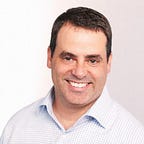Why Origin Invested in Tock
The Start
In 2014, Nick Kokonas wrote a manifesto highlighting that if restaurants used tickets instead of free reservations, restaurants could dramatically reduce no-shows, optimize their supply chains, improve working capital, and eliminate staff answering the phones to take reservations. It made so much sense — the world SHOULD work that way, but it does not. It prompted the question: why are consumers willing to buy a ticket for a performance but not for a restaurant? Are consumers willing to change this behavior? Could Tock help restaurants — notoriously difficult businesses — dramatically improve operations and financial results?
Chicago restaurant Next, was the first to implement Nick’s ticketing approach. By all measures, both Next and the new ticketing system were smashing successes. After perfecting ticketing with world-renowned restaurant Alinea, Nick set out to provide this system to other restaurants, and Tock was born. Nick was beginning to demonstrate that he could reinvent yet another aspect of dining.
Around this time Brian Fitzpatrick (aka “Fitz”) joined up with Nick. Fitz was the first engineer in the Chicago Google office and is one of the most respected technologists and tech team builders in the Midwest. Leaving a comfortable, high-profile job at Google, Fitz joined Nick to build out Tock for scale.
From Primordial to Product
Over time, the product expanded to include dynamic pricing, deposits, private dining, non-prepaid reservations, special events and prix fixe menus — features not offered by OpenTable and demanded by restaurants in the “middle” which are constantly battling no-shows and attempting to fill tables on slower nights. This was crucial to prove that the company has serious scale and was not limited to those lucky restaurants that are flooded with patrons. Tock landed many of these middle-market restaurants as customers, and they are now a majority of Tock’s revenue.
Tock makes money by charging a subscription fee to restaurants, differentiating itself from Opentable which charges restaurants per person seated. With Tock, restaurants have an incentive to encourage patrons to use it for all times, events, and menu types, creating a partnership between Tock and its restaurant customers.
The Investment Decision
I met Nick initially in 2013, and we quickly discovered we had a shared interest in documentaries. We kept in touch over the years, and I made sure to watch two documentaries, Spinning Plates and Chef’s Table, to learn more about his partnership with world renowned chef, Grant Achatz, and to learn the stories behind Alinea and Next. It’s the first time my diligence/reference process involved watching feature films.
It’s no surprise that I followed the seed funding of Tock with a great deal of interest. Nick had simultaneously become a global legend in the restaurant world and was sought out for his unconventional thinking on not only tickets but on topics such as the end of tipping/including service in prices. I admired that his thinking was unshackled from the norm — an ingredient common among the best entrepreneurs with whom I’ve worked.
From the moment we began to explore the possibility of leading an investment in Tock, we were very impressed with the progress.Tock was processing millions of dollars of transactions per week and had grown the number of restaurants dramatically with little marketing. Indeed, consumers were flocking to use Tock and restaurants were signing up from eight countries. Tock, with a limited sales team, was able to sell efficiently over the phone. We knew from Grubhub that the market is enormous. Seeing the initial empirical evidence that Tock’s subscriptions could be sold globally using inside sales, combined with the features that appealed to restaurants of various kinds, convinced us that there was a lot of opportunity to scale the company. Consumers, in the hundreds of thousands, were embracing Tock.
The other factor in our decision to lead the round was the team. Nick is an outlier in many ways. Along with his partner Grant Achatz, he made huge innovations in the crowded and slow-to-adopt restaurant industry, where many people doubted their approach (“what? they are going to completely change the type of cuisine every four months???”). Nick has a mix of intelligence, irreverence for the status quo, confidence, deep industry expertise and unmatched will. Fitz has built an incredible technology team — one of the hardest things to pull off in this talent market — and a product that can handle Ticketmaster-selling-Hamilton-tickets type scale from the beginning. Fitz’s skills nicely complement Nick’s, including Fitz’s even temperament which balances Nick’s natural passion and enthusiasm. Perhaps most importantly, the strength of their partnership rests on mutual respect, and in many ways emulates the successful partnership that Nick and Grant have enjoyed over the last 12 years.
Like any deal, Tock has a lot of work ahead of it, and much is far from proven. It’s operating in a huge market that is in dire need of a better approach, with a team that has demonstrated many times it can transform how businesses operate. The company’s underlying thesis seems inevitable, and now it’s time to help them execute. We look forward to working with Nick and Fitz to do whatever we can to make Tock the huge success we all believe it will become.
